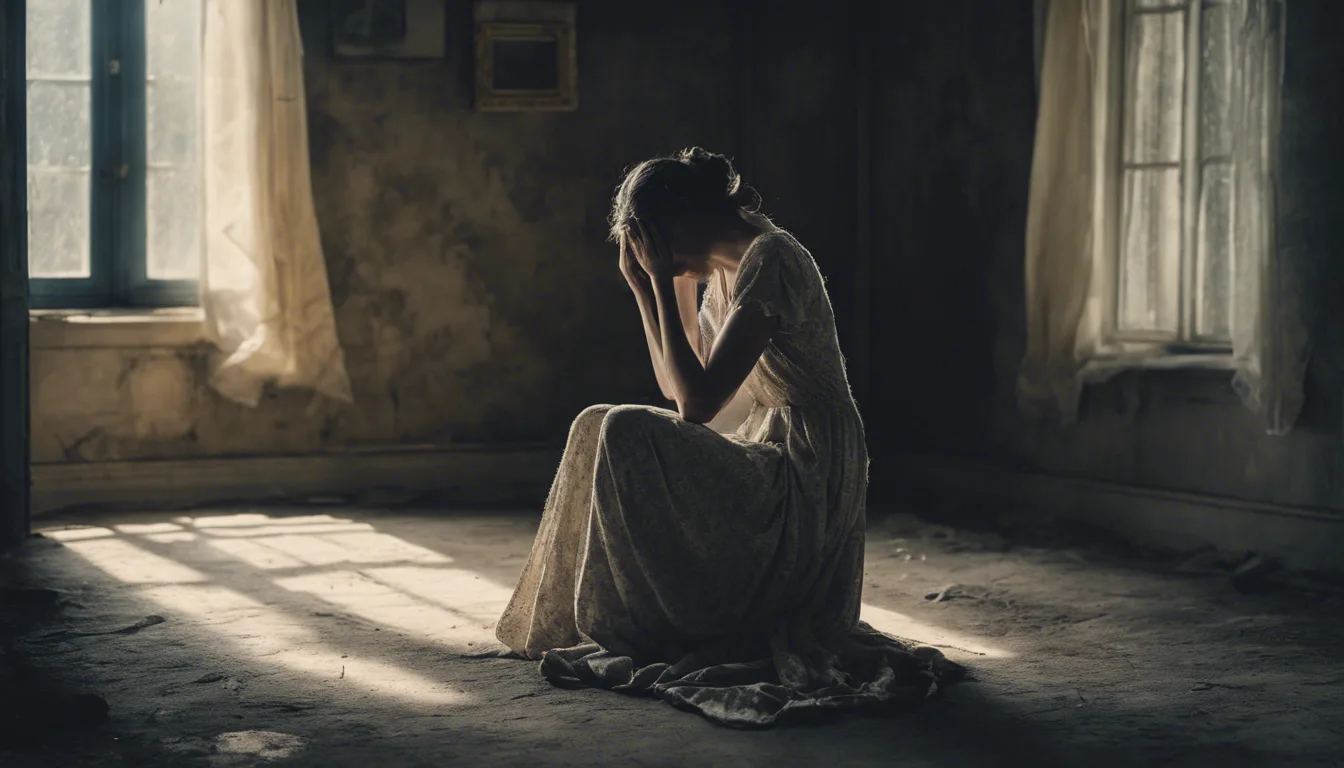10 Demographics of People Who Might Dream of Crying
Want a Personalized Dream Interpretation?
Curious about how people like you interpret this dream symbol? Explore personalized interpretations tailored to your demographic. Get personalized insights for free!
Get Free Interpretation Now →Table of Contents
1. Children
- Crying in dreams for children:
When children dream of crying, it often reflects their emotional state in real life. They may be feeling sad, scared, frustrated, or overwhelmed. Crying in a dream can be a way for children to release these emotions and process them in a safe and controlled environment.
- Common reasons why children cry in dreams:
-
They are feeling overwhelmed by their emotions.
-
They are experiencing a difficult situation in their life.
-
They are feeling sad or lonely.
-
They have a fear or worry that is causing them stress.
-
They are feeling pressure to succeed or meet expectations.
- What to do if your child has a dream about crying:
-
Talk to your child about their dream.
-
Help them to identify the emotions that they were feeling in the dream.
-
Reassure your child that it is okay to feel these emotions and that you are there to support them.
-
Help your child to develop coping mechanisms for dealing with difficult emotions.
-
Consider seeking professional help if your child is having frequent or distressing dreams about crying.
2. Adolescents
In the realm of dreams, tears hold a profound significance for adolescents, a time of heightened emotions and transformative experiences. Adolescent dreamers are often grappling with complex feelings, internal struggles, and the pressures of growing up. When they cry in their dreams, it's an expression of their inner turmoil, a release valve for pent-up emotions that may be difficult to articulate in waking life.
For adolescents, crying in dreams can symbolize a range of emotions, from sadness and grief to relief and catharsis. It can be a way of processing difficult experiences, such as loss, rejection, or failure. It can also be a sign of emotional growth and self-awareness, as adolescents begin to navigate the complexities of their own feelings and relationships.
Dreams involving crying can also shed light on an adolescent's fears and anxieties. Crying in a dream may represent a fear of change, uncertainty about the future, or a sense of isolation or loneliness. It can also be a manifestation of underlying insecurities or self-doubt.
Notably, the context of the dream and the emotional state of the adolescent upon waking can provide valuable insights into the meaning of their dream. For instance, if an adolescent wakes up feeling refreshed and emotionally lighter, it may suggest that the dream has served as a form of emotional release and healing. Conversely, if they awaken feeling sad or distressed, it may indicate that the dream has touched upon unresolved emotional issues that require attention.
Overall, dreams involving crying offer a unique window into the emotional landscape of adolescents, providing a glimpse into their inner struggles, fears, and aspirations. By exploring these dreams, adolescents can gain a deeper understanding of themselves and their emotional experiences, fostering personal growth and resilience.
3. Adults
-
For adults, dreaming of crying can symbolize a release of pent-up emotions, a way to process difficult feelings, or a sign of resilience in the face of adversity.
-
It can also indicate a need for self-care, attention to emotional needs, or a desire for support from others.
-
Dreams of crying can be a way for adults to come to terms with past experiences, grieve losses, or navigate challenging life transitions.
-
They can also be a sign of emotional exhaustion, burnout, or the need to set boundaries in personal or professional life.
-
Exploring the context and specific details of the dream can provide insights into the underlying emotions, stressors, or messages the dreamer may be trying to communicate.
4. Elderly
-
In the realm of dreams, tears shed by the elderly often carry profound meanings that transcend mere emotional release. While they may symbolize sorrow or loss, they can also represent transformation, resilience, or untapped wisdom.
-
For those in their twilight years, crying in dreams could reflect a longing for simpler times, a desire for closure, or a readiness to embark on a new chapter in life.
-
It could also be a sign of their emotional and spiritual strength, their ability to confront their fears and embrace the challenges of aging with grace and fortitude.
-
Dreams of crying can be a way for the elderly to process and come to terms with their own mortality, to grieve the loss of loved ones, or to acknowledge the inevitable passage of time.
-
Yet, these dreams can also be a source of comfort and reassurance, as they serve as reminders of the enduring bonds of love and connection that transcend the physical realm.
-
Understanding the symbolism of crying in dreams can provide valuable insights into the emotional and psychological well-being of the elderly, helping them navigate the complexities of aging and find peace and fulfillment in their later years.
5. Men
For men, dreams of crying can bring to the surface the full spectrum of our emotions, inviting us to confront our inner vulnerabilities and repressed feelings. These dreams often arise during times of emotional upheaval, such as grief, loss, or personal struggles, encouraging us to acknowledge the emotions we may be suppressing in our waking lives.

Crying in a dream can be a sign of emotional release, allowing men to shed tears and confront their feelings openly. It can also symbolize the need for emotional healing and comfort, reminding us to seek support from loved ones or seek professional help if needed.
Dreams about crying can also be a manifestation of inner strength and resilience. They can represent a man's ability to face challenges head-on and overcome obstacles, acknowledging their vulnerability while still maintaining their determination to persevere.
Moreover, crying in a dream can sometimes be a sign of joy or relief, particularly when associated with a happy or victorious event. It can symbolize the release of pent-up emotions, such as happiness or gratitude, and represent a sense of catharsis and emotional breakthrough.
6. Women
- For women, dreams of crying could often signify emotional distress, sorrow, or overwhelming feelings.

-
It's a way for the subconscious mind to process and release pent-up emotions.
-
There can be various reasons behind these dreams, ranging from personal struggles to hormonal shifts.
-
Dreams of crying may serve as a coping mechanism, helping women navigate difficult situations by expressing their emotions in a safe space.
-
Analyzing the context of the dream and identifying the triggers can provide valuable insights into the underlying emotional state.
-
It's essential for women to acknowledge and address the emotions associated with these dreams rather than suppressing them, as they can impact overall well-being.
-
Recording and interpreting recurring dreams of crying can be beneficial in understanding patterns and seeking appropriate support or self-care strategies.
-
Seeking professional help may be necessary if the dreams persist and significantly affect daily life, as they could indicate deeper emotional issues requiring specialized intervention.
7. Pregnant Women
-
Pregnant women often experience dreams that involve crying, and these dreams can be powerful and emotional.
-
These dreams can symbolize a variety of things, including the physical and emotional changes that the woman is going through during pregnancy, her fears and anxieties about the future, and her hopes and dreams for her child.
-
Crying in dreams can also be a way for the woman to process and release emotions that she is feeling in real life, such as stress, anxiety, or grief.
-
It's important to remember that dreams are subjective and personal, and the meaning of a dream symbol can vary depending on the individual.
-
If you are a pregnant woman who is experiencing dreams that involve crying, it's important to talk to your doctor or a mental health professional to discuss what these dreams might mean for you.
8. New Parents
-
Crying with joy: New parents often experience overwhelming emotions, both positive and negative. If you dream of crying with joy, it may symbolize the immense happiness and love you feel for your new child.
-
Crying from frustration: Newborns can be demanding, and it's common for parents to feel frustrated at times. If you dream of crying from frustration, it may be a manifestation of the challenges and stresses you're facing as a new parent.
-
Crying from sadness: Some new parents experience postpartum depression, which can lead to feelings of sadness, hopelessness, and guilt. If you dream of crying from sadness, it may be a sign that you're struggling with your mental health and need support.
-
Crying for help: Being a new parent can be isolating and overwhelming, and it's important to reach out for help when you need it. If you dream of crying for help, it may be a sign that you're feeling overwhelmed and need support from your partner, family, or friends.
9. People Experiencing Grief or Loss
-
Crying in Dreams for Grieving Individuals:
- Dreams of crying can be a common occurrence for individuals who are experiencing grief or loss.
- These dreams often serve as a release for pent-up emotions and a way to process the pain associated with the loss.
- The act of crying in the dream can be cathartic, allowing the dreamer to express their emotions safely and without judgment.
- Dreams of crying can also be a way for the dreamer to connect with the person or thing they have lost, providing a sense of comfort and connection during a difficult time.
- It's important to remember that these dreams are a normal part of the grieving process and can be a helpful way for individuals to heal and come to terms with their loss.
10. People with Anxiety or Depression
For individuals struggling with anxiety or depression, dreams involving crying can hold significant symbolic meanings. These dreams often reflect the emotional turmoil and distress experienced by these individuals in their waking lives. Crying in dreams can symbolize a release of pent-up emotions, a longing for comfort and support, or a sense of helplessness and despair.
Emotional Release:
Dreams of crying can provide a safe space for people with anxiety or depression to express and release their overwhelming emotions. The tears in these dreams can represent a cathartic release of pent-up sadness, anger, frustration, or grief. By allowing these emotions to flow freely in the dream world, individuals may find temporary relief and a sense of emotional release.
Seeking Comfort and Support:
Crying in dreams can also symbolize a longing for comfort, support, and understanding from others. These dreams may reflect the individual's desire for emotional connection and reassurance. The dream may be urging the person to reach out for help, to confide in someone they trust, or to seek professional support.
Helplessness and Despair:
Dreams of crying can also convey feelings of helplessness and despair. The individual may feel overwhelmed by their emotions and unable to cope with the challenges they face. The tears in these dreams represent a sense of hopelessness and the belief that there is no way out of their current situation.
Encouraging Self-Care:
Dreams of crying can serve as a reminder for individuals with anxiety or depression to prioritize self-care and emotional well-being. The dream may be urging the person to take steps to manage their mental health, such as seeking therapy, engaging in relaxation techniques, or making lifestyle changes that promote emotional well-being.
Seeking Professional Help:
If dreams of crying become frequent or distressing, it may be beneficial for individuals to consider seeking professional help. A therapist can help explore the underlying causes of these dreams, provide coping mechanisms, and develop strategies for managing anxiety or depression.
11. People with Post-Traumatic Stress Disorder (PTSD)
Crying in Dreams: A Deeper Dive into the World of PTSD
When it comes to dreams, crying often carries a profound significance, especially for individuals struggling with Post-Traumatic Stress Disorder (PTSD). Delving into this realm, we uncover a tapestry of emotions, hidden meanings, and potential healing opportunities.
For people with PTSD, dreams can serve as a window into the tumultuous landscape of their inner selves. Crying in these dreams frequently reflects the emotional turmoil and distress they endure. It's a manifestation of the pain, fear, and grief that often linger in the aftermath of trauma.
These dreams often transport the dreamer back to the traumatic event, reliving its horrors with vivid intensity. The tears in these dreams symbolize the overwhelming emotions that resurface, demanding acknowledgment and release.
However, it's not just reliving the trauma that triggers these emotional outbursts. Dreams can also reveal the impact of PTSD on a person's daily life. The stress, anxiety, and hypervigilance that accompany PTSD can lead to emotional exhaustion and an inability to cope with everyday stressors. The tears in these dreams become a desperate plea for relief, a cry for help in navigating the challenges of living with PTSD.
Yet, dreams can also be a catalyst for growth and healing. The act of crying in a dream can be a cathartic experience, providing an outlet for pent-up emotions. It's a way for the subconscious to process traumatic memories and begin the healing journey.
Moreover, dreams can offer glimpses of resilience and hope. Sometimes, people with PTSD dream of overcoming their fears, finding support, or discovering new paths forward. These dreams can be empowering, reminding them that healing is possible and that they're not alone in their struggles.
Exploring the symbolism of crying in dreams for people with PTSD unveils a complex tapestry of emotions, challenges, and potential growth opportunities. Dreams can be a safe space for processing trauma, releasing pent-up emotions, and discovering the path toward healing and recovery.
12. People Who Have Experienced Trauma
-
Crying in dreams for individuals who have experienced trauma often represents a release of pent-up emotions, suppressed pain, and unresolved grief.
-
These dreams may serve as a safe space for expressing emotions that are challenging to acknowledge or process during waking hours.
-
The act of crying in the dream can be cathartic, allowing the dreamer to release intense feelings and gain emotional relief.
-
The content of the dream itself may provide insights into the specific source of trauma or emotional distress that is being processed.
-
Recurrent crying dreams might indicate ongoing emotional struggles or the need for further healing and support.
-
Seeking professional help from a therapist or counselor can be beneficial in understanding the underlying causes of these dreams and developing strategies for emotional regulation and healing.
13. People Who Are Experiencing Significant Life Changes
-
For those in the throes of life-altering transitions, dreams involving intense weeping can serve as poignant metaphors for their emotional upheaval.
-
These dreams often reflect a mix of grief, fear, and uncertainty as individuals navigate uncharted territories.
-
The tears in these dreams can symbolize a release of pent-up emotions that have been suppressed or ignored during waking hours, allowing the dreamer to process and come to terms with their shifting circumstances.
-
Crying in dreams can also be a way for the subconscious to acknowledge the challenges and obstacles encountered during significant life changes, providing a safe space for emotional expression and catharsis.
-
Dreams of crying can be particularly common during periods of transition marked by loss, such as the death of a loved one, divorce, or job loss. In these instances, the tears may represent a natural and healthy response to the pain and sorrow associated with letting go.
-
Conversely, dreams involving crying can also surface during times of positive change, such as starting a new job, moving to a new city, or entering a new phase of life. Here, the tears may symbolize a mix of excitement, anticipation, and trepidation as individuals embrace the unknown.
-
Regardless of the specific life change, dreams of crying often serve as a reminder to honor and acknowledge the full spectrum of emotions that accompany these transitions, both positive and negative. By embracing the tears in their dreams, individuals can gain a deeper understanding of themselves and their experiences, fostering resilience and growth as they navigate life's ever-changing landscape.
14. People Who Are Feeling Overwhelmed or Stressed
- Feeling overwhelmed or stressed: Crying in a dream can symbolize feeling overwhelmed or stressed in waking life. This could be due to a variety of factors, such as work, school, relationships, or personal problems. The dream may be a way for the dreamer to process these emotions and find a way to cope with them.
- Helplessness and vulnerability: Crying in a dream can also represent feelings of helplessness and vulnerability. The dreamer may feel like they are in a situation where they have no control and are at the mercy of others. This can be a very difficult and frightening feeling, and the dream may be a way for the dreamer to express these emotions and come to terms with them.
- Loss and grief: Dreaming of crying can sometimes be a sign of loss or grief. The dreamer may be mourning the loss of a loved one, a relationship, or a job. The dream may be a way for the dreamer to process these emotions and begin to heal.
- Catharsis and release: Crying in a dream can also be a form of catharsis or release. The dreamer may be expressing emotions that they have been holding in for a long time. This can be a very healing and therapeutic experience, and the dreamer may feel lighter and more at peace after having the dream.

Back to interpretation of crying